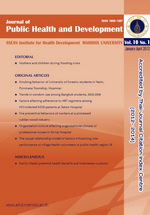The causal relationship model of factors influencing role performance of village health volunteers in public health region 18
Main Article Content
Abstract
This study was conducted to assess the adherence to ART medication regimens among HIV-infected/AIDThe purpose of this study was to test a causal relationship model of factors influencing role performance of village health volunteers in public health region 18. Kanter’s structural theory of power in organizations, and the ideas about psychological empowerment of Thomas and Velhouse and Spreitzer has provided a guide for the conceptual framework of this study. The research instruments were eight set of questionnaires: 1) Personal Data, 2) Job Characteristic, 3) Community Relationship, 4) Volunteerism, 5) Work Empowerment,
6) Self-Esteem, 7) Job Satisfaction, and 8) Community Commitment. Using Cronbach’s alpha criteria, reliability of the questionnaire were .80 - .96. Data were analyzed by descriptive statistic, the confirmatory factor analysis and the test for the fitness between the hypothesis model and the empirical data were done by statistical program.
Results showed the causal relationship model of factor influencing role performance of village health volunteers designed by researcher was fitted with the empirical data. This was considered through well – fitted measures that were found. Variables having a statistically significant direct effect on the role performance of village health volunteers were job satisfaction and self-esteem. Variable having a statistically significant
indirect effect on role performance of village health volunteers were work empowerment, community relationship, volunteerism, and job characteristic.
Ministry of Public Health or relevant authorities should design effective management to job characteristic,
community relationship, volunteerism, job satisfaction and self-esteem to promote and facilitate role performance effectiveness of village health volunteers.


